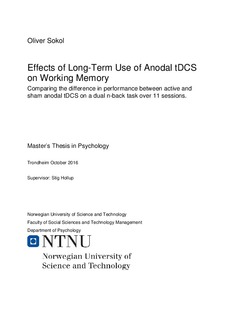Effects of long-term use of anodal tDCS on working memory : comparing the difference in performance between active and sham anodal tDCS on a dual n-back task over 11 sessions
| dc.contributor.advisor | Hollup, Stig | |
| dc.contributor.author | Sokol, Oliver | |
| dc.date.accessioned | 2017-01-12T13:34:30Z | |
| dc.date.available | 2017-01-12T13:34:30Z | |
| dc.date.issued | 2016 | |
| dc.identifier.uri | http://hdl.handle.net/11250/2427148 | |
| dc.description.abstract | This study observes the effects of repeated use of anodal transcranial direct current stimulation over 11 sessions of training on a dual n-back task. Participants (14) in an active stimulation group were compared to a sham stimulation group (12). The dual n-back task used was an adaptive program that increased and decreased the difficulty (‘n’ level) in response to performance. The difficulty level and the number of correct and erroneous responses were recorded in order to look at the progress rates between groups. The study did not find any lasting significant effects in the comparison of the two groups, except for one significant result of less mean auditory erroneous responses made by the control group. The study supports the data found by past meta-analysis of tDCS studies on working memory by showing that there is no significant improvement in performance following anodal tDCS stimulation. | nb_NO |
| dc.language.iso | eng | nb_NO |
| dc.publisher | NTNU | nb_NO |
| dc.title | Effects of long-term use of anodal tDCS on working memory : comparing the difference in performance between active and sham anodal tDCS on a dual n-back task over 11 sessions | nb_NO |
| dc.type | Master thesis | nb_NO |
| dc.subject.nsi | VDP::Samfunnsvitenskap: 200::Psykologi: 260 | nb_NO |
Files in this item
This item appears in the following Collection(s)
-
Institutt for psykologi [3140]
